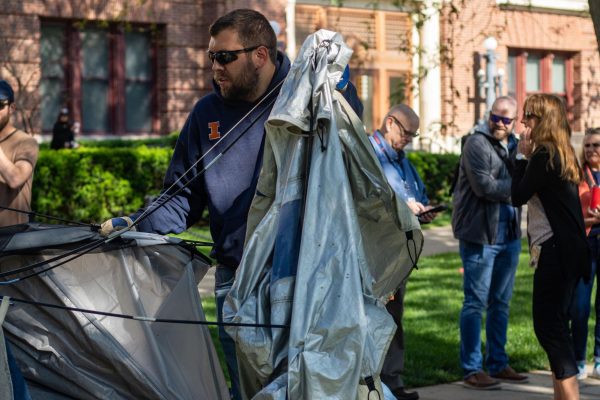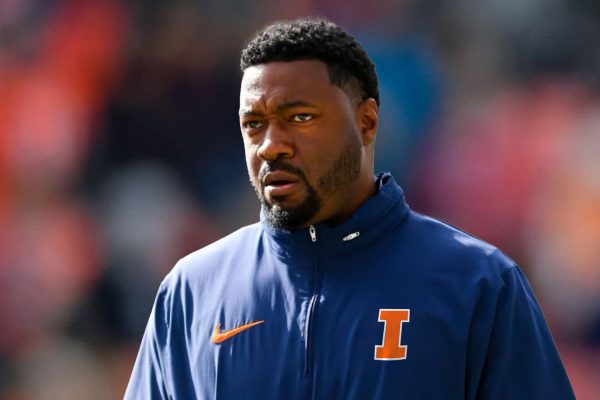Column: Point & Counterpoint
March 29, 2006
Do the math
The latest iteration of the incoherent strategic plan sets a goal to increase minority representation on campus. The problem is that affirmative action like this doesn’t help a demographic be competitive; it gives them a handicap in the competition. The real issue is the failed public schools that short-change these groups and Americans in general because they do not respond to the needs of their clients.
The problem with any monopoly is that it loses any incentive to respond adequately to customer desires. Ask any economics professor whether monopolies produce economically efficient or desirable outcomes. Anyone that answers ‘yes’ should resign now.
Bureaucracies do not respond flexibly to the needs of their constituents and it is foolish to think that all of a sudden this law of politics would be waived in the case of schools. One can look to Washington D.C. which pays over $16,000 per pupil but only has 12 percent of eighth grade students reading proficiently. The nearby Catholic schools manage with only $10,000 a pupil and have dramatically better results.
The National Education Association, arguably the largest education lobby in the country, spent its annual meeting debating on action items that have little to do with improving students learning. Instead, it debated on absurdities like anti-Walmart campaigns and the war in Iraq.
Get The Daily Illini in your inbox!
The cases of teacher abuse of children and parents are many – including cases of teachers demanding children be drugged into submission, telling parents they have no right to question the values they are teaching children, and the almost once a month case of a 20-something teacher having sex with her students.
It seems the position of the anti-voucher crowd is that parents are not suited to make decisions regarding their children’s welfare, nor should they be trusted with their children’s welfare. If they were intellectually honest they’d suggest we get rid of parents all together and have children raised in group homes. Parents are the best and most suited to make decisions regarding their children, not bureaucrats.
In a society where individuals are free to determine their own values and what organizations they will or will not affiliate with, it is absurd that there are some demanding that freedom be denied in the case of schooling.
Vouchers would not only provide an opportunity for those in failing schools to have a chance at success in life, but would also strengthen public schools. The reason for public schools to exist is to educate. If public schools perform, they’ll get the money. If they don’t, private schools will.
No one is suggesting the performing schools in Naperville be burnt down, but it is just absurd that the minority and poor students stuck in failed schools be forced to remain put. If there is ever going to be racial or gender equity in this nation, it is because all children are afforded the chance of a good education, not because they get extra points on their college entrance application.
John Bambenek is a graduate student and academic professional at the University. His column appears on Wednesdays. He can be reached at opinions@daily- illini.com.
Don’t vouch for vouchers
As the debate over school vouchers rages on, the divide between public and private schools is growing wider. Voucher programs compromise the separation of church and state, encourage segregation and take much needed funds away from public schools.
In the same way that this administration calls its logging industry-friendly, forest-destroying agenda the Healthy Forests Initiative, and its pollution-promoting EPA-gutting agenda the Clear Skies Initiative, President Bush likes to cloak his advocacy of school vouchers with the rhetoric of the civil rights movement.
After the Supreme Court upheld a school voucher program in Cleveland, President Bush triumphantly said, “The court declared that our nation will not accept one education system for those who can afford to send their children to a school of their choice and for those who can’t, and that’s just as historic.” Not surprisingly, his comparison of school vouchers to Brown v. Board of Education was misleading and completely off base.
School vouchers exacerbate the problem of having privileged and non-privileged education systems. Despite what the president claims, vouchers won’t help inner city families or bridge the gap between public and private schools. A $2,500 voucher will not be of much help to a poor family who wants to send their child to a $10,000-plus private school.
Private schools are already notoriously selective about which students attend. Often, acceptance is based on criteria such as a student’s behavior and scholastic ability, which (not so) coincidentally are related to family income and stability. Enticing families to send their children to private school through vouchers would only reinforce the separation between families rich enough to get their kids into private school and families who can only afford public school.
And this is not even taking into consideration the religious aspect of this debate. According to the Anti-Defamation League, 80 percent of vouchers would be used for religious institutions. In the Cleveland voucher program that the Supreme Court upheld, 96 percent of students using vouchers have gone to subsidized religious schools. Having the government fund these religious institutions to such a degree is a clear violation of the separation between church and state.
Most importantly though, school vouchers take desperately needed money from the public school system. Vouchers would only serve to make the rich private school even richer at the expense of the poorer public schools. If President Bush truly wanted to make education equal for all, he would stop using government money to encourage students to go to private schools. This only punishes the already-troubled public schools.
Between the severe lack of funding and the arbitrary testing imposed by the No Child Left Behind Act, vouchers could be a crippling blow to the public school system. Supporting a voucher program essentially says that you are giving up on the public school system entirely. That may be fine for the upper and middle class families, but low-income and inner-city families will ultimately be left behind once more.
Eric Naing is a senior in LAS. He is a proud product of the public school system. His column appears on Tuesdays. He can be reached at [email protected].






